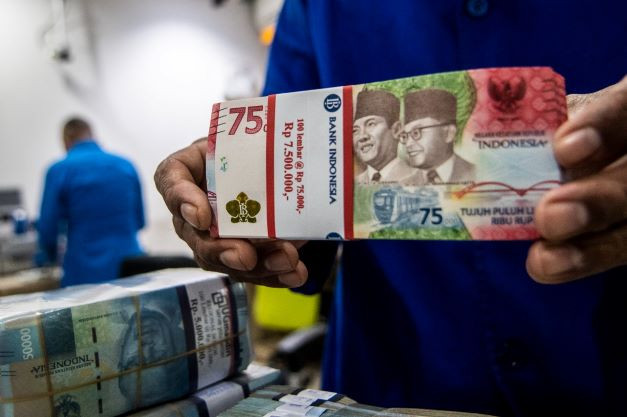Popular Reads
Top Results
Can't find what you're looking for?
View all search resultsPopular Reads
Top Results
Can't find what you're looking for?
View all search resultsThe rupiah dodges a bullet
With the Fed having held rates steady for second time in a row, analysts say the central bank might leave them unchanged in December as well, creating calm for emerging market currencies such as our own until the end of the year.
Change text size
Gift Premium Articles
to Anyone
E
merging economies can rest easy, at least for now, after the Federal Reserve decided at its Nov. 1 meeting to keep interest rates at their current level, even though the United States central bank said it was unclear whether overall financial conditions were restrictive enough to properly tame inflation.
The decision has allowed the rupiah to dodge a depreciation to Rp 16,000 or beyond against the US dollar. Such a psychologically significant figure would have taken a toll on investors’ confidence in the currency.
A further weakening of the rupiah could certainly weigh on the economy, as imports would increase in value and the state budget would need to cover much higher spending on energy subsidies and “compensation spending”, given the country’s significant fuel and oil imports.
The last time the rupiah hit that low was in 2020, at the height of COVID-19, when foreign investors dumped Indonesian stocks and securities as they panicked over the spread of the coronavirus and its economic impacts.
Before the announcement, the rupiah had been hovering above Rp 15,900 for some weeks and had inched up to Rp 15,966 against the greenback hours before the announcement.
But despite the apparent expectations, the Fed’s recent decision caused the rupiah to move away from the daunting phycological threshold of Rp 16,000 to the dollar, with the currency falling under Rp 15,600 on Saturday.
With the Fed having held rates steady for second time in a row, analysts say the central bank might leave them unchanged in December as well, creating calm for emerging market currencies such as our own until the end of the year.
The Fed decision was followed by a US$113 billion Japanese economic stimulus package passed on Nov. 2, and China is expected to roll out its own fiscal stimulus package soon to spur on its economic recovery. Both are positive signs for the sluggish global economy and could help shore up Indonesian exports.
However, Indonesia ought to keep a sharp eye, as uncertainty still persists.
Despite continued months of surplus, Indonesia’s trade balance had shrunk to just US$8 billion by September down from the $15 billion in the same month last year, as a result of declines in exports and normalizing commodity prices.
That means the country is moving closer each month to spending more dollars in trade than it gets, which could potentially add pressure to the rupiah later on.
In addition, Indonesians have been reliant on foreign services such as shipping, health care and tourism.
With food production continuing to struggle against the impact of El Niño and other extreme weather conditions, Indonesia has become reliant on increasingly expensive food supplies from overseas as other countries struggle with similar agricultural issues.
This could result in costly imported inflation that would run counter to the government’s efforts to keep prices under control.
Indonesia has enacted policies and incentives to keep export receipts in country to help the central bank keep the rupiah stable, but exporters have expressed dissatisfaction with the policy.
The government should be aware that this too could undermine the effectiveness of the policy in safeguarding the rupiah against US dollar pressure unless it convinces businesses that keeping their US dollars in country is beneficial for the companies themselves, not just the country.
Bank Indonesia’s (BI) late-October benchmark rate hike to 6 percent may appear excessive given how much better off the rupiah seems these days.
But the central bank’s preemptive move was justifiable given the information available, as the macroeconomic costs of doing too little would have been greater than those of doing too much.











